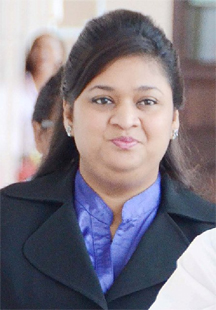A revised Automatic Promo-tion policy, under which secondary-level students who fail Mathematics and English will no longer be advanced to higher grades, will be in place when the new school year begins in September.
The revision of the policy, which was implemented in 2010 under then Education Minister Shaik Baksh, is taking place against the backdrop of both negative feedback from various stakeholders as well as an effort to ensure more students qualify for university education.

Education Minister Priya Manickchand told a news conference yesterday that following consultations held with teachers, students, and parents in more than 30 meetings, a decision has been taken to modify the policy.
She said that the rationale behind the implementation of the policy was to create a system which would mitigate the negative effects of grade repetition. Such negative effects include a high dropout rate due to embarrassment and the burden on students of having to repeat subjects that they may have excelled in despite failing overall.
It turns out, however, that the policy did not find popularity among parents, teachers, and even the students it was engineered to benefit. These stakeholders, Manickchand said, expressed a high degree of disapproval for the policy and stated their belief that promotion from one grade to another should be earned and not automatic.
A consultation with these stakeholders prior to the policy’s implementation may have yielded these findings but no such consultations were held.
Asked why the ministry failed to consult the stakeholders who would be affected the most by the policy, Chief Education Officer Olato Sam, who was also at the press conference, did not say why they were overlooked. He said though, that the ministry relied on the counsel of experts in the area of education, who all thought that the policy would have been beneficial.
Since the policy’s implementation, many teachers have complained that students have become complacent and lazy. One teacher, who asked that his name not be mentioned, said that when he chastised a particular student for not making a good attempt at his school work, the student blatantly said that he would be promoted whether or not he did the work.
Many have argued that the policy, even though implemented just two years ago, has already taken a toll on the attitudes of children, and has thus affected the results seen after Caribbean Secondary Education Certificate (CSEC) sittings since this time. Sam, however, said that since no studies were done, such an assessment could not be made.
He noted, however, that despite the negative implications of the policy and the ensuing negative feedback, the policy of automatic promotion did have some positive effects. In addition to the reduction of the number of school dropouts seen each year, Sam said that students, not feeling the pressure of having to excel in all subject areas, have been left to focus on the subjects that they do well in and have excelled in these areas at the CSEC examinations.
Nevertheless, the policy is slated to be revised for September and the ministry already has a clear idea of some of the modifications that are to be made. The ministry’s new policy is not a full deviation from the Automatic Promotion though, and it will be geared towards ensuring matriculation. The term, according to the minister, has been operationalised within the context of Guyana to mean that it will enable students to graduate with the minimum requirement of five CSEC subjects, inclusive of Mathematics and English with passes from grades one to three, thereby qualifying them for entry to the University of Guyana (UG).
Manickchand stated that if a student scores below the overall pass mark set by the school in 50% of the subject areas they take, they will be required to repeat the grade. However, she explained that if a student does exceedingly well in mandatory subjects such as Mathematics, English and science subjects, but fail to attain the overall passing grade as stipulated by the respective schools (50% or 60% as the case may be), he/she may still be allowed to proceed to the next grade, but will be encouraged or even required to drop the areas in which they underperformed.
On the other hand, however, students who fail to meet the stipulated overall pass mark for the respective school, failing mandatory subjects but excelling in others such as Physical Education or Art, will be asked to repeat the grade.
In a release, the ministry said, “The aim of the policy is to help students succeed at English and Mathematics. A student needs at least five CSEC subjects, at one sitting, including English A and Mathematics at grades 1 to 3 to matriculate. The statistics shows that many schools attain 100% pass in many CSEC subjects, however, the matriculation rate is not satisfactory because of the poor pass rates in English and Mathematics.”
NGSA results
Sam, commenting on performances seen in this year’s National Grade Six Assess-ment (NGSA), reported that girls continue to outperform boys in every subject area in all ten regions. He also said that the overall performances in Mathematics have improv-ed while performances in English and Science have declined somewhat. Students’ performance in Social Studies, meanwhile, have held steady.
Sam further disclosed that coastal schools continue to outdo hinterland regions, although there are indications that the gap which has always existed is being reduced. This, he said, is a result of the fact that most of the teachers in hinterland schools are trained. In the case of Region Nine, in particular, Sam said that 100% of the teachers placed in the schools in this region are trained.





